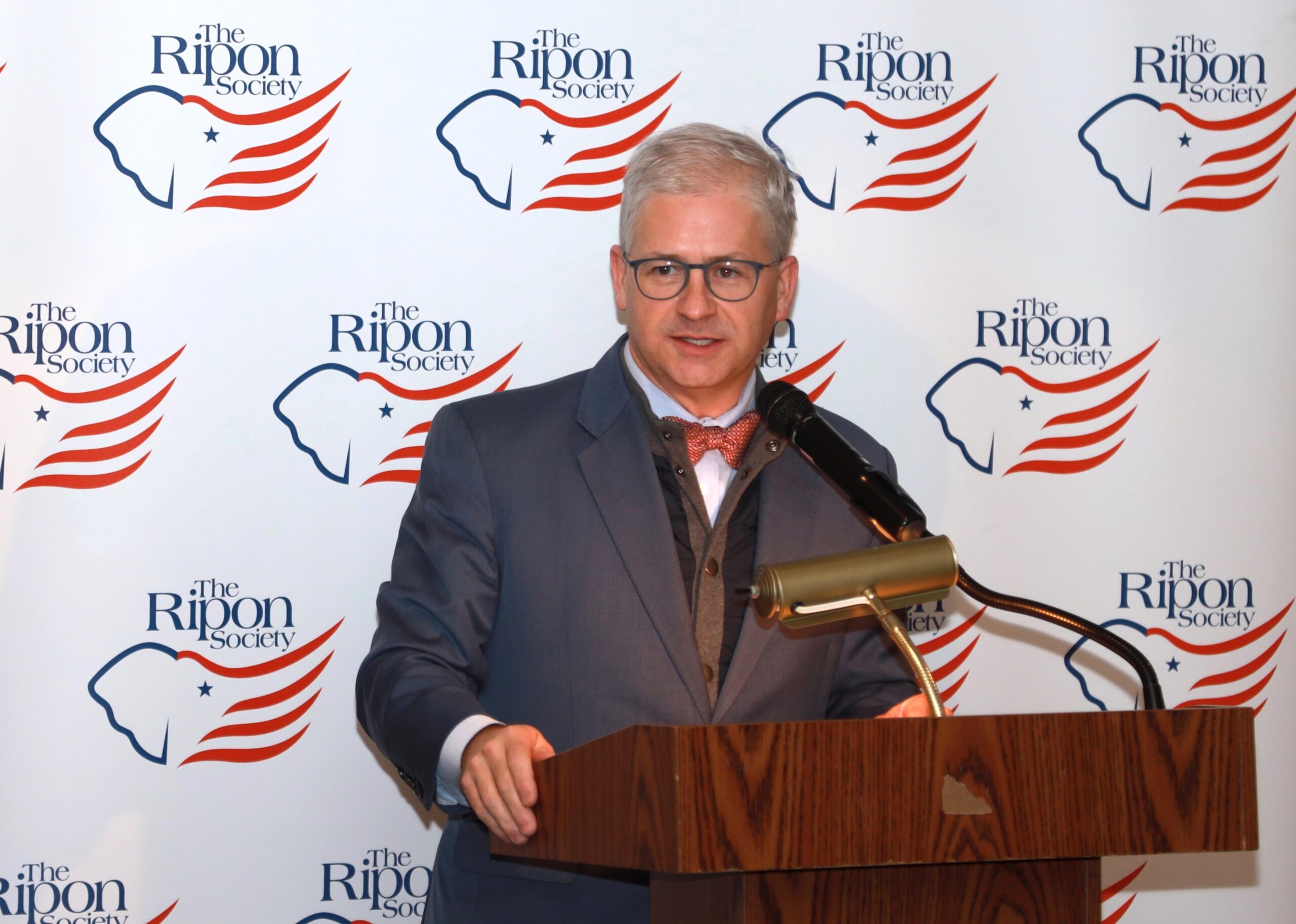“I can count it in trillions of dollars of savings.”
WASHINGTON, DC — Just one day before the “laddered” Continuing Resolution was set to expire, The Ripon Society held a breakfast meeting yesterday morning with Chairman of the House Financial Services Committee Patrick McHenry (NC-10) to discuss the committee’s 2023 triumphs and what is left on the “to-do” list before McHenry makes his exit at the conclusion of the 118th Congress.
“As you know, two years ago at this time I made the decision that I wanted to chair the Financial Services Committee, [and] not be in House Republican leadership,” stated McHenry in his opening remarks. “I was focused on moving policy, and my objectives were focused on getting that policy through the committee – things that I’ve been working on for years.”
The Chairman continued, highlighting three major points of legislation that needed to be taken care of, and one that should be taken care of, in the 118th Congress: “the debt ceiling negotiation, funding the government, providing for our warfighters, and possibly a farm bill.”
“I said, ‘Look, I’d rather move policy than work on those four major issues to whip.’ And so, I would leave the debt ceiling up to the leadership. I’d leave the government funding up to the leadership. What I didn’t realize is that I was going be involved in those two things that I didn’t want to be involved in.”
Prior to serving as Chairman of the House Financial Services Committee, McHenry was tapped by then-Majority Whip Steve Scalise (LA-01) to serve as the party’s Chief Deputy Whip in 2015. McHenry has served as Chair of the House Financial Services Committee since January 2023. In October of 2023, McHenry was selected to serve as Speaker Pro Tempore for the weeks between the McCarthy and Johnson Speakerships, though McHenry has found he much prefers committee work.
“In committee, we’re able to work with folks that are much more engineers than salespeople,” shared McHenry. “You’re crafting policy and the set of politics around you. I set the agendas for the three major items we wanted to move through committee and what I wanted to do in 2023. We achieved those three things.
“[First], updating our data privacy standards that former Chairman Mike Oxley wrote in the late nineties, under [the] Gramm-Leach-Bliley Act. Our data privacy standards have not been updated to a digital world, and we need to address those in the financial realm. We moved that out of committee in the first quarter.
“Then we moved our capital formation package, which was led by subcommittee Chair Ann Wagner. We moved a large substance of mostly bipartisan [legislation] out of committee, and we’ve taken some of those across the House floor. Capital formation [is] really the key to the lifeblood of our economy. We want to make sure that the United States remains [at] the forefront of the flow of securities and the power of our securities market, and it should be foremost in the world.
“Third and finally was a novel set of legislation because we had to write something completely new, which was addressing digital assets and stablecoins. Now this is new because the technology’s new. We have to adapt and change our public laws to what becomes new in technology.
“We had bipartisan votes on both our stablecoin package – that’s your on-ramp into digital assets – and then the role of the Securities and Exchange Commission and the Commodities Future Trading Commission on your ability to buy and sell what is called cryptocurrency. We moved that package out, and we moved those three things out of committee by the end of July.
“Along the way, we developed a response to the political fight around ESG – Environmental, Social and Governance – and making sure people understand it’s not just the words, it’s the mechanisms that we have to focus on. The mechanisms of non-economic actors that are driving corporate behavior and making it more difficult to be a public company in the United States because of politics.
McHenry noted that Reps. Bill Huizenga (MI-04) and Bryan Steil (WI-01) have produced a four-part legislative package to combat the influence of ESG in American business. The Chairman said that the committee had wanted to pass this legislation in the fall of 2023, but “Obviously, the fall got complicated. So, we’re going to work in 2024 to realize all those policy wins through the House. With our negotiations with the Senate, we’ve got a great opportunity with that.”
Shifting gears to discuss the work of House Republicans on the floor, McHenry reiterated how important it was that House Republicans were able to reign in out-of-control government spending.
“You had to have a durable deal that forced appropriators in both the House and the Senate and in both parties to actually appropriate under the new terms so you can restrict spending. But you have to be able to perform to that lower spending level and that re-prioritization of defense spending in an unsafe world, [and] less spending on domestic discretionary programs. So, we had a bridge to do that. We had substantial cuts. We had the Congressional Budget Office say that this was the largest spending reduction package Congress had ever passed.
“When people say, ‘What is the value of House Republicans?’ I can count it in trillions of dollars of savings over what was last year’s spending, not what they were going to spend if Democrats ran the House, the Senate, and the White House.”
On a final note, McHenry observed what he now calls “the bill of the Congress” that was led by Speaker Johnson and gave Republicans an additional $6 billion of negotiating power.
“The new Speaker came in and said, ‘We have got to improve the deal.’ And after two and a half months, he was able to exchange $16 billion of cuts that we negotiated for different cuts. It’s the same top line, the same level of spending reduction. He got $6 billion of COVID recoveries that were not available to us in May. It’s a good deal. It’s a positive deal. The debt ceiling was the most significant piece of legislation that this Congress has passed.”
To view Chairman McHenry’s remarks before The Ripon Society yesterday morning, please click the link below:
The Ripon Society is a public policy organization that was founded in 1962 and takes its name from the town where the Republican Party was born in 1854 – Ripon, Wisconsin. One of the main goals of The Ripon Society is to promote the ideas and principles that have made America great and contributed to the GOP’s success. These ideas include keeping our nation secure, keeping taxes low and having a federal government that is smaller, smarter and more accountable to the people.




